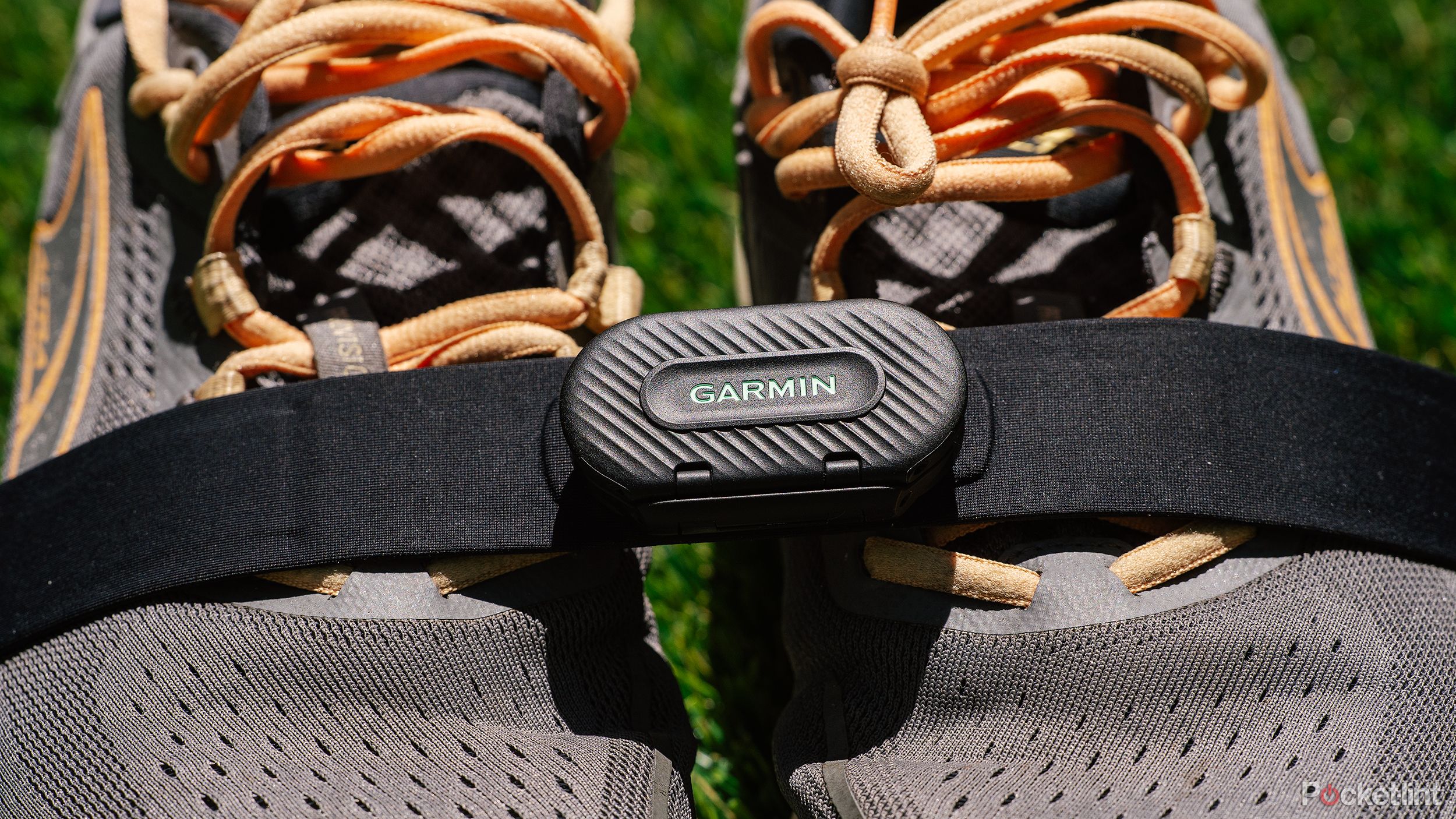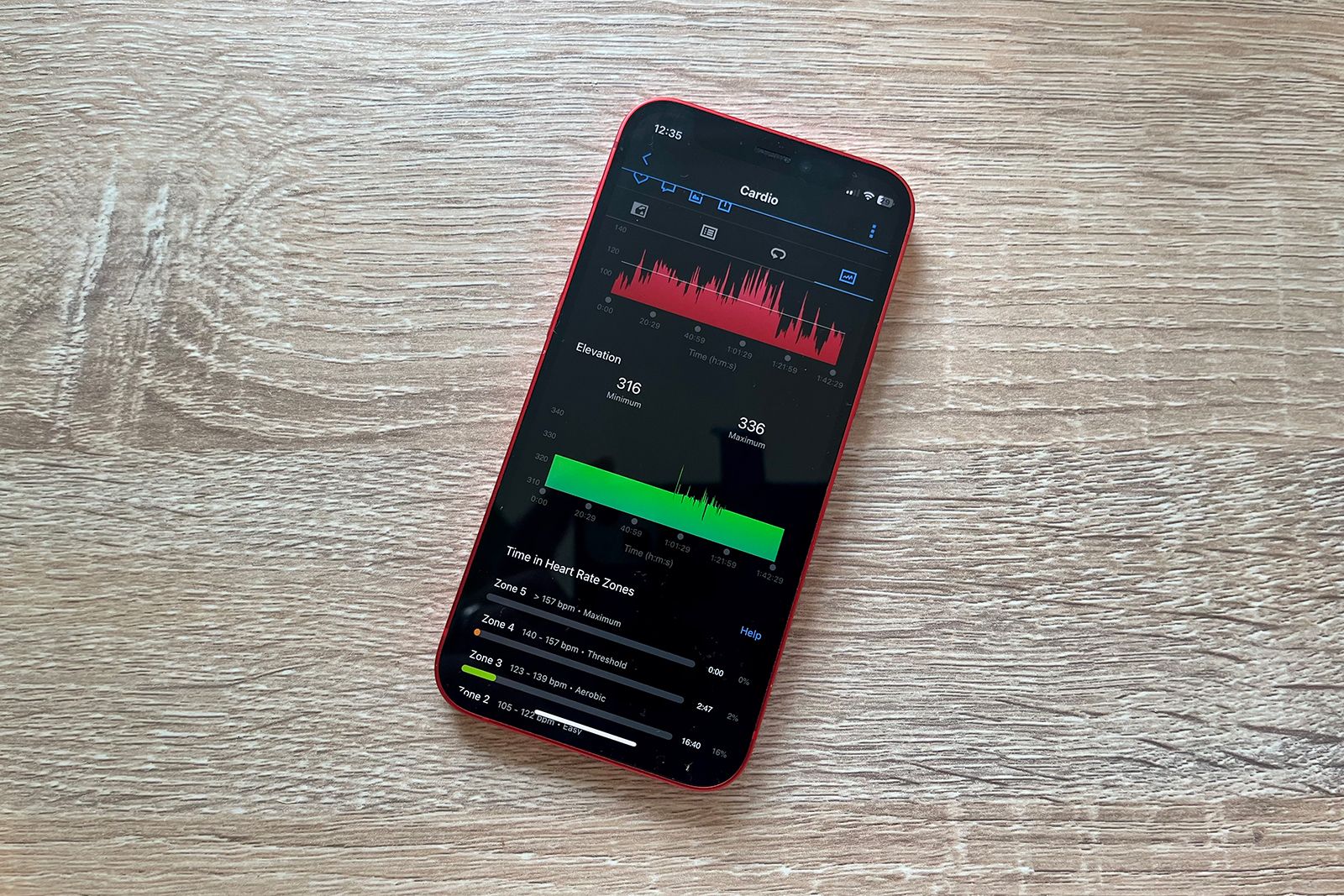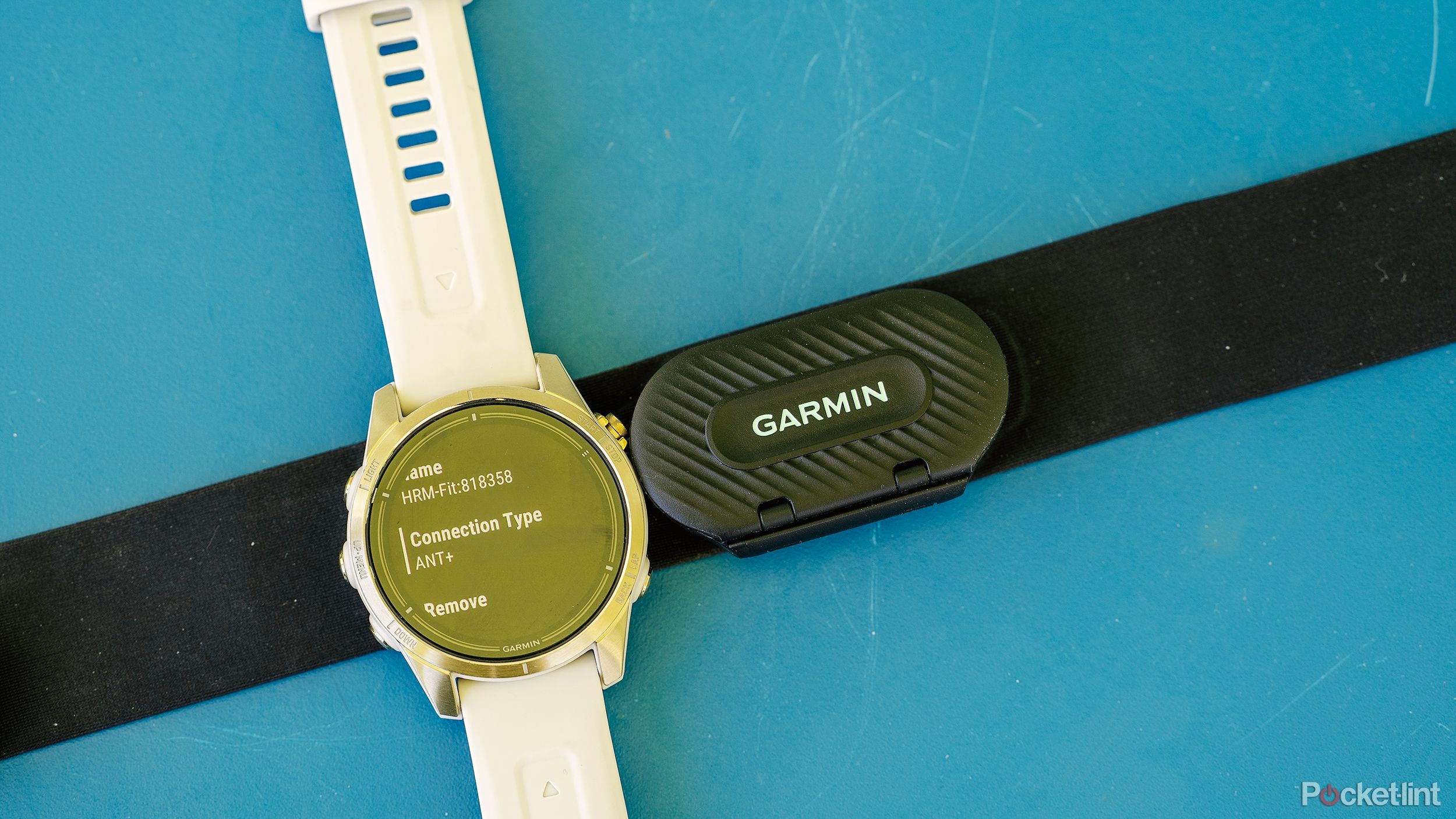Key Takeaways
- Garmin HRM-Fit is designed for sports bra wearers, clipping onto a sports bra instead of using a full chest strap.
- It offers accurate data and is easy to wear.
- It’s pricier than other Garmin models, though it fills a niche for those who dislike traditional chest straps.
It’s no secret that most products are designed for and by men, which is why chest-based heart rate monitors don’t always play friendly with sports bras. So, when Garmin announced a heart rate monitor designed specifically for women (or anyone who wears a sports bra), I was intrigued.
Instead of using a strap that goes all the way around, it is a partial band that clips onto a sports bra. That cuts down on tight straps, which is definitely nice. But does it still work well? And is it worth having?
Most chest-based heart rate monitors use a band that goes all the way around your chest. It falls at roughly the same spot as the band on most sports bras, which can get uncomfortable. It can also be tricky to get it in the right spot and to keep it there with a sports bra. In order for my chest-based heart monitor to stay in place, I have to have it quite tight, which gets old when I have it on for long periods.
Best Garmin watches: Expert tested and reviewed
We’ve put the best Garmin watches through their paces and have found the top ones you need for any exercise routine.
Garmin took a new approach with its HRM-Fit. Instead of using a strap that goes all the way around, it is a partial band that clips onto a sports bra. That cuts down on tight straps, which is definitely nice. But does it still work well? And is it worth having? I tried it out for a few weeks and, admittedly, have some mixed feelings.

Garmin HRM-Fit
Instead of a strap that goes around the chest, the Garmin HRM-Fit uses clips that attach the monitor to a sports bra band for a more comfortable fit.
- Records accurate data
- Comfortable and easy to wear
- Provides access to running dynamics with a compatible Garmin watch
Price, specs, and availability
The Garmin HRM-Fit is available at a range of retailers for $150.
Garmin HRM-Fit
- Brand
- Garmin
- Battery Life
- Up to 12 months
- Price
- $150
- IP rating
- 3 ATM
- Dimensions
- 13.2 x 1.3 x 0.7 inches
- Colors
- Black
Design, materials, and fit
A simple, straightforward design makes it ideal to use.
When I first took the HRM-Fit out of the box, I was a little surprised by the bulkiness. I knew it had to clip on somehow, but it still surprised me how much those clips protruded. Despite having essentially half the amount of strap as the HRM-Pro, it weighs an ounce more.
The HRM-Fit uses three clips across the strap to hold it in place: one on each side and the third over where the module is. These are made of plastic, but they feel really durable. It’s important to note that not all sports bras will work with the HRM-Fit. Garmin specifies that it is compatible with medium- and high-support sports bras. The main thing to keep in mind is that you need a definite band to attach it to, and that band needs to fall at the right place on your chest. Long-line sports bras won’t work, for example, as it would sit way too low. I also found that bras with a thicker band are a little challenging to slot into the spaces where the clips will hold it, though not impossible.
Though Garmin doesn’t specify a material for its straps, the HRM-Fit feels exactly the same as the other Garmin heart rate monitors. My other Garmin monitors have lasted ages with little wear, so I’m confident that the HRM-Fit will be no different.
There are cleaning instructions right on the strap as well, so if you, like most, instantly throw out the instructions, you’ll always have those as a reminder to wash your strap.
At 1.2 by 2.2 by 0.6 inches, the module on the HRM-Fit is just slightly larger than the one on the HRM-Pro Plus. It’s powered by a CR2032 and requires a coin or flathead screwdriver to open the battery compartment. That door is quite snug, so it took some work to get it off the first time, but that does provide more confidence if using this in the water.
 Features, software, and experience
Features, software, and experience
Serious athletes rejoice.
Like other heart rate monitors, the HRM-Fit offers ANT+ and Bluetooth Smart connectivity. It supports up to three Bluetooth connections and unlimited ANT+ connections. This means you can pair it with watches, cycling computers, and even treadmills and Peloton machines.
Garmin packs lots of capabilities into its heart rate monitors, and the HRM-Fit is no different. It has nearly identical features to the HRM-Pro Plus. At the basic level, that includes real-time heart rate transmission when out of the water and heart rate variability (HRV) support. The more advanced features include Garmin Running Dynamics, Indoor pace and distance data, Garmin Running Power, Cross Country Skiing Power, and offline workout support. All of those are only possible when paired with a compatible Garmin watch, however.

What is Garmin Connect and how do you use it?
See the health and fitness data from your Garmin devices in all its glory using the Garmin Connect app.
You’ll also be able to pair the HRM-Fit with the Garmin Connect app, which allows you to capture intensity, steps, calories, and heart rate when you don’t wear a watch during a workout. The app will also show you the battery status of the strap within the workout summary data.
 Performance while working out
Performance while working out
A good grip with accurate data.
On my first use, I was a bit concerned about how well the strap would stay in place. After clipping the HRM-Fit onto the bottom of a sports bra, I was pleased to discover that it feels really solid. Even with bouncing and moving around a lot, it doesn’t budge. I didn’t do any HIIT workouts but did pull on it while attached to my sports bra, and it didn’t budge. Despite that, there are also no sharp teeth that could rip a sports bra, which is appreciated since those aren’t cheap.
I would recommend putting your sports bra on first and then attaching the HRM-Fit. That ensures you get it in the right position but also that it won’t be bunched up when you put the sports bra on. Don’t forget to get the sensors slightly wet before putting it on, too.
The biggest reason I was excited about the HRM-Fit is that I usually want to take my heart rate monitor off as soon as I’m done with a workout. I get really sick of having something so tight around my chest for extended periods of time. That definitely isn’t the case with the HRM-Fit. I barely even notice it is on me, which is definitely refreshing. I thought I would notice that bulk, but luckily, other than when my arms were close to my body, I did not.
I barely even notice it is on me, which is definitely refreshing.
While Garmin’s heart rate sensor tech can be reliably accurate, the key to getting accurate data with heart rate monitors is to have them tight against your body. While my sports bra is fairly tight, compared to how I wear a normal chest strap, it is relatively loose. I was concerned that I wouldn’t get accurate data or that it would cut out during a workout if it didn’t have a good enough connection to my skin. Luckily, though, that hasn’t been the case.
I couldn’t double-up on chest-based heart rate monitors like I do when reviewing watches, but I did compare the heart rate data to my Garmin Epix Pro on a few bike rides (the HRM-Fit was paired with my Garmin head unit, not the watch). The numbers were essentially identical for the entirety of all of those rides.

Coros Heart Rate Monitor review: Armed with information
Comfort and reliability make the Coros Heart Rate Monitor armband a great alternative to a chest strap.
Verdict: is the HRM-Fit worth it?
I legitimately like the HRM-Fit and appreciate how much better it works for my body and preferences with a sports bra. It’s comfortable to wear even for long workouts, stays put no matter what, is relatively easy to put on and take off (depending on the bra), and provides accurate data.
My main qualm with the HRM-Fit is the price. The device doesn’t use any revolutionary or fancy technology that isn’t already in Garmin’s heart rate monitors. Yet, it is $20 more than the already pricey HRM-Pro Plus. It feels like just another instance of a pink tax, with women’s items costing more than men’s for no real reason. It’s disappointing and frustrating, to say the least.
My main qualm with the HRM-Fit is the price. The device doesn’t use any revolutionary or fancy technology that isn’t already in Garmin’s heart rate monitors.
All-in-all, while I, so far, prefer this to a traditional chest strap, it does seem to solve a rather niche problem that not everyone has. If you aren’t bothered by the straps of traditional chest-based monitors, then it simply doesn’t make sense to spend a bit extra on this. But for those who, like me, hate tight straps and want extra data, it seems worth it to spend a bit more.
Trending Products

Cooler Master MasterBox Q300L Micro-ATX Tower with Magnetic Design Dust Filter, Transparent Acrylic Side Panel…

ASUS TUF Gaming GT301 ZAKU II Edition ATX mid-Tower Compact case with Tempered Glass Side Panel, Honeycomb Front Panel…

ASUS TUF Gaming GT501 Mid-Tower Computer Case for up to EATX Motherboards with USB 3.0 Front Panel Cases GT501/GRY/WITH…

be quiet! Pure Base 500DX Black, Mid Tower ATX case, ARGB, 3 pre-installed Pure Wings 2, BGW37, tempered glass window

ASUS ROG Strix Helios GX601 White Edition RGB Mid-Tower Computer Case for ATX/EATX Motherboards with tempered glass…


 Features, software, and experience
Features, software, and experience  Performance while working out
Performance while working out 







